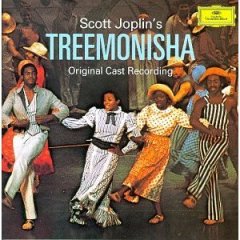Scott Joplin – Treemonisha (1910/1972)
Scott Joplin – Treemonisha (1910/1972)

CD1 1. Treemonisha / Act one - No. 1 Overture Houston Grand Opera Orchestra 7:31 2. Treemonisha / Act one - No. 2 The bag of luck Ben Harney 6:37 3. Treemonisha / Act one - No. 3 The corn huskers Carmen Balthrop 0:43 4. Treemonisha / Act one - No. 4 We're goin' around (A Ring Play) Kenneth Hicks 2:10 play 5. Treemonisha / Act one - No. 5 The wreath Carmen Balthrop 1:36 6. Treemonisha / Act one - No. 6 The sacred tree Betty Allen 7:41 7. Treemonisha / Act one - No. 7 Surprised Carmen Balthrop 0:17 8. Treemonisha / Act one - No. 8 Treemonisha's bringing up Betty Allen 3:57 9. Treemonisha / Act one - No. 9 Good advice Edward Pierson 4:43 10. Treemonisha / Act one - No. 10 Confusion Betty Allen 2:45 CD2 1. Treemonisha / Act two - No. 11 Superstition Raymond Bazemore 3:39 2. Treemonisha / Act two - No. 12 Treemonisha in Peril Raymond Bazemore 2:52 3. Treemonisha / Act two - No. 13 Frolic of the bears Houston Grand Opera Orchestra 3:08 4. Treemonisha / Act two - No. 14 The wasp nest Raymond Bazemore 1:14 5. Treemonisha / Act two - No. 15 The rescue Carmen Balthrop 1:26 6. Treemonisha / Act two - No. 16 We will rest a while Houston Grand Opera Chorus 1:24 7. Treemonisha / Act two - No. 17 Going home Carmen Balthrop 0:39 8. Treemonisha / Act two - No. 18 Aunt Dinah has blowed the horn Houston Grand Opera Chorus 1:34 9. Treemonisha / Act three - No. 19 Prelude Houston Grand Opera Orchestra 3:33 10. Treemonisha / Act three - No. 20 I want to see my child Betty Allen 2:23 play 11. Treemonisha / Act three - No. 21 Treemonisha's return Betty Allen 3:34 12. Treemonisha / Act three - No. 22 Wrong is never right (A Lecture) Curtis Rayam 5:52 13. Treemonisha / Act three - No. 23 Abuse Kenneth Hicks 0:28 14. Treemonisha / Act three - No. 24 When villains ramble far and near (A Lecture)
Sir Willard White 4:56 15. Treemonisha / Act three - No. 25 Conjurors forgiven Carmen Balthrop 1:08 16. Treemonisha / Act three - No. 26 We will trust you as our leader Carmen Balthrop 8:34 17. Treemonisha / Act three - No. 27 A real slow drag Carmen Balthrop 5:32 Treemonisha - Carmen Balthrop Monisha - Betty Allen Remus - Curtis Rayman Ned - Willard White Zodzetrick - Ben Harney Lucy - Cora Johnson Andy - Kenneth Hicks Luddud - Dorceal Duckens Cephus - Dwight Ransom Simon - Raymond Bazemore Parson Alltalk - Edward Pierson Houston Grand Opera Orchestra & Chorus Gunther Schuller – director
Joplin (ca. 1868-1917), whose fame as a composer had skyrocketed in the 1960s and '70s as a result of the "rediscovery" of his rags by Gunther Schuller, Joshua Rifkin, and others, poured his heart and soul into this tale of black sharecroppers and their struggle against ignorance and superstition in late-19th-century Arkansas. Yet he was never able to get the work staged in his lifetime. This recording comes from Treemonisha's belated full-scale staging at Houston Grand Opera in 1975, with a splendid cast headed by Carmen Balthrop, Betty Allen, Curtis Rayam, and Willard White, directed by Frank Corsaro and conducted by Gunther Schuller (who provided the arrangements and the scoring). Joplin's tuneful score is a lively mix of ragtime, minstrel show, vaudeville, grand opera, Wagner, Verdi, and Offenbach, with lots of dancing, a big role for the chorus, and arias and ensembles of affecting simplicity and beauty. Schuller gets an impressively crisp performance from the orchestra, a Dixieland band with added strings and winds, and paces the performance to perfection--for fun, just listen to the Act II-ending chorus "Aunt Dinah has blowed the horn." The recording sounds as fresh and bright as the inspiration that speaks from every page of this all-American score. --Ted Libbey
I already have the Houston Treemonisha on vinyl but after sixteen years it is likely to deteriorate so I bought the CD too. Treemonisha is not grand opera in the traditional sense; it is not a ragtime opera; it isn't this, that or the other thing. It is itself, uniquely beautiful, profoundly moving and probably a work of genius. Surely we, as music lovers of the world, have matured beyond the compulsion to place every piece of music in a defining category. Some criticisms of Treemonisha I have read are little less absurd than admonishing the player of an Indian raga for not modulating according to sonata form. The disease is a product of too much learning and sadly afflicts talented professionals even more commonly than it does the man in the street.
The forces behind Treemonisha are very eloquently explained in the liner notes, and need no further elaboration. The love and regard for the music by those producing and performing it is abundantly obvious. The technical quality of the recording is excellent and the notes provide even the most naive listener (and Treemonisha is superbly naive in the best sense of the word) with everything necessary in the way of background. A review cannot influence a prejudiced mind. This work, if any, is a prime candidate for Debussy's maxim - just listen, it is enough. ---E.G. Jones
Zmieniony (Sobota, 17 Październik 2015 14:29)








